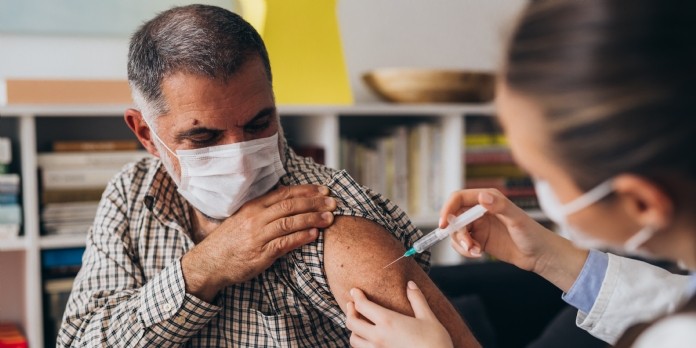The Covid-19 vaccination campaign has just started and must quickly accelerate. In order to maximize the places of vaccination, the question arises of allowing companies to vaccinate employees in their premises. But under what conditions would this be possible?
In order to extend the places of vaccination against Covid-19 without setting up “vaccinodromes” which the government is not in favor of for historical reasons, the Minister of Labor, Élisabeth Borne, said she was in favor of considering the possibility for companies to have their employees vaccinated in their premises or within the premises of Occupational Medicine. Some already do this for seasonal flu. “Companies, which participate in the influenza vaccination strategy every year, can play a role in the vaccination strategy when the time comes.“, said the minister in an interview of January 5, 2021 on France Info.
Medef also seems to be in favor of it, in particular to promote resumption of work for employees in offices.
For several months, some companies have organized Covid-19 screenings for volunteer employees. They could therefore soon participate in the vaccination campaign.
Employer involvement should not, however, come into play before vaccination has been extended to what is called the “general population” that is to say after vaccination of residents of Ephad, professionals working in these establishments and presenting themselves an increased risk of severe disease or death, those over 75 and over 65, etc.
A means for the employer to respect its obligation to ensure the safety and health of employees
Under the terms of Article L. 4121-1 of the Labor Code, “the employer takes the necessary measures to ensure the safety and protect the physical and mental health of workers“, in particular through actions to prevent occupational risks. Vaccination against Covid-19 would come within this framework.
Vaccination in the workplace will, of course, be subject to strict conditions.. What are they ?
Who can vaccinate?
It is safer to advise that it is the occupational physician or one occupational nurse who carries out this vaccination, but the employer may also call on third parties such as private nurses.
Remember that an ordinance of December 3, 2020 authorized the occupational health services to participate in screening for Covid-19, to carry out screening tests and to vaccinate employees until April 16, 2021 for the instant.
Only employees who volunteer for vaccination will be able to be vaccinated in their company
The government has made it very clear that vaccination against Covid-19 will not be compulsory. But even if she was, companies could not force their employees to have them vaccinated. Vaccination is not the role of the employer who cannot impose on the employee, within the framework of the employment relationship, as obligations arising from the performance of the employee’s duties.
Consequently, employers will not be able to require employees to be vaccinated, any more than they will be able to make vaccination against Covid-19 a condition for returning to work “in person”, let alone continuing the contract. of work.
Employees refusing vaccination, whether by the company or otherwise, cannot be sanctioned by the employer for this refusal, nor can they be forced to remain in telework until they are vaccinated, which would amount to requiring vaccination.
To protect the employer, in due time, it is advisable to have each employee sign a document confirming that the employee wishes to be vaccinated. The latter must expressly give his consent to be vaccinated within the company.
What fears for respecting medical confidentiality?
Medical confidentiality must of course be fully respected, both by members of the company and by the people who will carry out the vaccination.
The cost of vaccination
The vaccine against Covid-19 is free for everyone, entirely covered by Social Security. There remains the rather heavy organizational cost that this implies.
Practical questions
In order to be able to vaccinate their employees, however, companies will have to consider many important practical questions:
Dedicate a specific room for vaccination with adequate ventilation,
Plan the protection elements for people carrying out the vaccination and employees to be vaccinated,
Plan the Necessary material,
Supervise the waste management,
· Plan the quantities of vaccines to buy and their transport,
Consider the possibility of storing vaccines according to their respective requirements, while waiting for vaccines that are easier to store than those currently authorized in France,
Guarantee the traceability and monitoring of vaccine batches etc.
In order to avoid their own responsibility towards the employees concerned, companies must be extremely careful in the management of this vaccination. We must also consider the the case of employees who are allergic to the vaccine and have a serious reaction ; it is essential that theemployer is protected in this regard against any resulting risk for the company.
Currently, only the government is authorized to order vaccines from laboratories; It remains to be seen how the government will consider the practical possibility for companies to obtain the necessary doses of vaccines.
These practical constraints are likely to be extremely heavy and nothing can be done without the full involvement of occupational health services. It is likely that only very large companies will embark on this operation, cumbersome to organize and costly in practical terms.
To know more
 —
—
Viviane Stulz is a lawyer at the Paris Bar, specializing in employment law. Partner within the SCM 5QB Lawyers, she is a founding member of the labor law lawyers’ union, AvoSial. She advises and assists French and foreign companies on all their labor law issues.=”https:>
–
–

